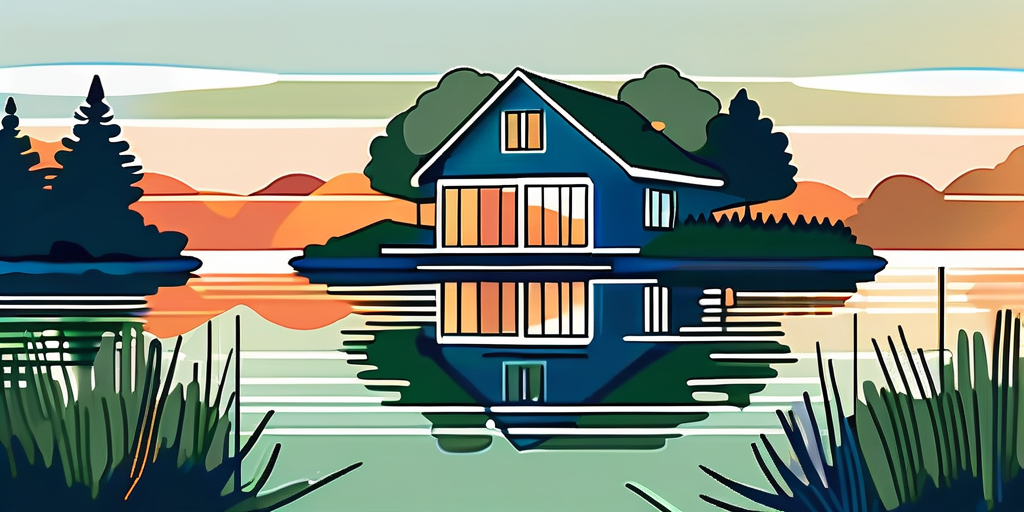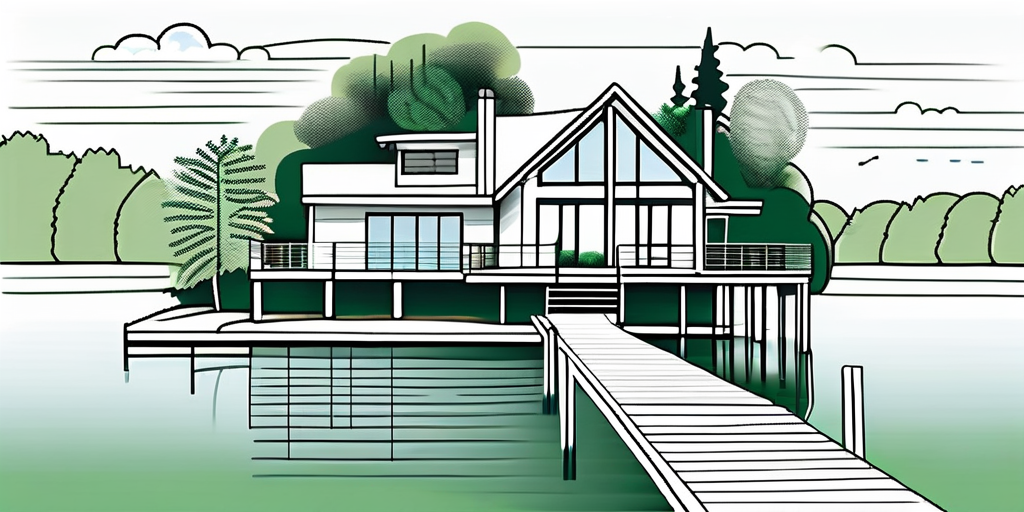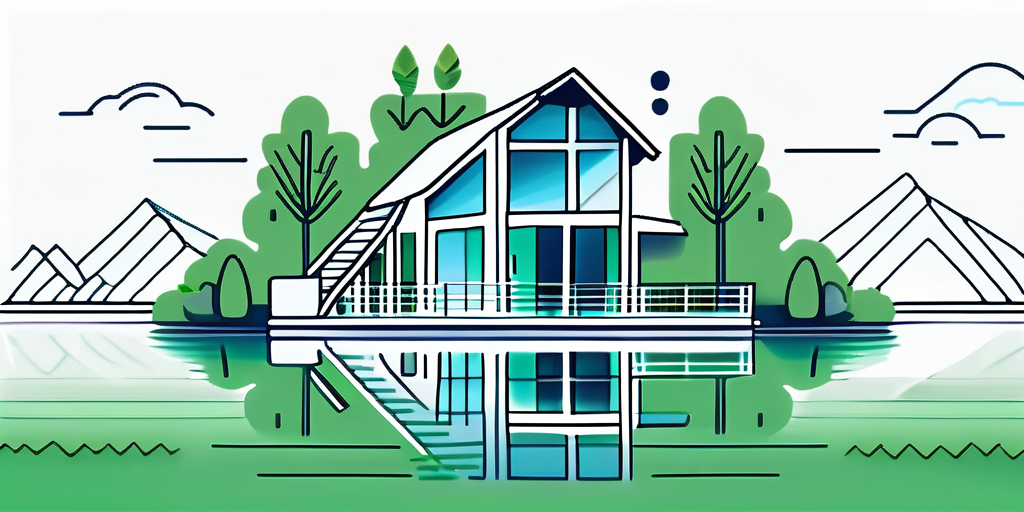
If you’ve ever dreamed of waking up to the gentle sounds of water lapping against the shore, or enjoying a stunning sunset view from your own deck, you might be considering a lake home. These properties offer a unique lifestyle that combines tranquility with natural beauty. In this guide, we’ll explore why lakefront living is so appealing, the essential aspects to consider when buying, financial implications, and legal factors you should be aware of. So grab a cup of coffee, and let’s dive right in!
Living by the lake is not just a choice of residence; it’s a lifestyle decision. The allure of lakefront properties stretches far beyond the picturesque views. For many, it's about the serenity that accompanies the gentle sounds of nature, the opportunity for outdoor activities, and the sense of community that often thrives around water bodies.

One of the most significant draws of lake homes is their charm. These properties often feature rustic designs, large windows, and sprawling decks where one can soak in nature. Whether it's a cozy cabin or a luxurious retreat, waterfront homes tend to blend beautifully with their surroundings. Imagine sipping your morning coffee or hosting a summer barbecue with friends and family while enjoying breathtaking views—such experiences are hard to replicate in urban settings.
Additionally, many lakefront homes come with unique architectural features that enhance their appeal. From exposed wooden beams to stone fireplaces, these elements create a warm and inviting atmosphere that draws people in. Many homeowners also take pride in landscaping, cultivating gardens that bloom with vibrant colors and fragrant flowers, further enriching the outdoor experience. The natural beauty surrounding these homes often serves as a canvas for artistic expression, with many residents incorporating outdoor art installations or decorative elements that harmonize with the environment.
Living near water has various health benefits as well. Studies suggest that proximity to water can reduce stress, lower anxiety, and promote overall wellbeing. The opportunities for outdoor activities like swimming, fishing, kayaking, and hiking contribute significantly to a healthier lifestyle, encouraging residents to stay active and connected with nature.
Moreover, the lakeside community often fosters stronger social connections. Neighbors bond over shared activities, whether it's fishing trips or seasonal festivities, creating a sense of belonging and camaraderie. Community events such as lakeside picnics, boat parades, and holiday celebrations not only bring residents together but also create lasting memories. The shared experience of living in such a picturesque setting cultivates friendships that can last a lifetime, as families gather to enjoy the beauty of their surroundings and support one another in their daily lives. This sense of community is often a significant factor in why many choose to make lakefront living their permanent home.
While the thought of owning a lake home may seem idyllic, it’s important to approach this significant investment with careful consideration. Here are some key factors to keep in mind.

Finding the perfect spot is crucial. Consider how far you want to be from your primary residence, as well as the accessibility of the property. Is it easy to get to? Check the proximity to nearby towns for necessities like groceries, healthcare, and entertainment. Remember, a beautiful home in a remote area can quickly become less appealing if you have to drive for hours just to pick up milk!
Additionally, think about the surrounding environment. Are there recreational opportunities nearby, such as hiking trails, fishing spots, or boating facilities? A location that offers a variety of outdoor activities can enhance your experience and provide endless enjoyment for family and friends. It’s also worth considering the seasonal changes in the area; some lakes may be bustling with activity in the summer but become desolate in the winter, which could affect your enjoyment and use of the property year-round.
The design and condition of the home are vital considerations as well. Older homes may have a lot of character, but make sure to assess the structure for any potential issues, such as foundation problems or outdated electrical systems. Additionally, think about how you plan to use the home. Will it be for weekend getaways or a permanent residence? This will influence your choices regarding layout and amenities.
When evaluating home design, consider the orientation of the property. A home that faces the lake can provide stunning views and maximize your enjoyment of the water. Look for features such as large windows or outdoor decks that can enhance your connection to the natural surroundings. Moreover, think about energy efficiency and maintenance; modern homes may offer better insulation and lower utility costs, while older homes may require more upkeep but can provide a unique charm that’s hard to replicate.
Water quality is paramount when purchasing lakefront property. Before buying, it’s wise to inquire about the lake’s water quality and any potential environmental concerns. Is the water clean for swimming? Are there any harmful algae blooms in the area? Moreover, consider how the community manages lake maintenance, including any initiatives in place to keep the water clean and safe for recreation.
It’s also beneficial to understand the lake’s ecosystem. Research the types of fish and wildlife that inhabit the area, as this can impact your recreational activities and overall enjoyment of the property. Additionally, inquire about any local regulations regarding lake use, such as boating restrictions or fishing licenses, which can affect your plans for enjoying the water. Engaging with local residents or community boards can provide valuable insights into the lake’s health and the community's commitment to preserving its natural beauty.
Now, let’s talk numbers! Owning a lake home is undeniably a significant investment, so understanding the financial implications is crucial for making smart decisions.

First and foremost, consider your budget. Lake homes can vary widely in price, depending on location, size, and amenities. Be prepared for additional financing options, which may differ from traditional home loans. Some lenders may offer specific loans catered to second homes or vacation properties, so shop around to find the best rates and terms. Additionally, it’s wise to factor in closing costs, which can include appraisal fees, title insurance, and inspection fees. These can add thousands to your initial investment, so having a clear understanding of these costs will help you avoid any surprises at the closing table.
Aside from the purchase price, ongoing costs such as property taxes, insurance, and maintenance can add up quickly. Ensure you take these expenses into account when budgeting. It’s also essential to understand any special assessments that may apply to waterfront properties for community upkeep or development projects. Furthermore, consider the seasonal nature of lake homes; winterizing your property and preparing it for off-season can incur additional costs. Regular maintenance, such as dock repairs or landscaping, is also vital to preserving the property’s value and ensuring it remains a welcoming retreat for you and your guests.
If you’re considering using the home as a vacation rental when you’re not using it, think about the potential for rental income. Properties near popular tourist spots can often fetch a good rate, but be sure to research local laws and regulations regarding short-term rentals. Additionally, consider the costs associated with managing a rental property, such as cleaning services, property management fees, and marketing expenses. Investing in quality furnishings and amenities can also enhance your rental appeal, allowing you to command higher rates and attract repeat guests. Moreover, during peak seasons, the demand for lake homes can skyrocket, providing a lucrative opportunity for owners willing to rent out their space during the busiest times of the year.
When it comes to lakefront properties, there are various legal and environmental considerations you must be aware of before making a purchase.
Water rights can be a complicated issue. Ensure you fully understand what rights come with your property. In some areas, there may be restrictions on how you can interact with the water, such as limitations on boat docks or swimming areas. Consulting with a knowledgeable real estate agent or attorney who specializes in waterfront properties can help clarify these regulations. Additionally, it's important to recognize that water rights can vary significantly from one state to another, and even between local jurisdictions. Some regions operate under the doctrine of riparian rights, where property owners have rights to the water adjacent to their land, while others may follow the prior appropriation doctrine, which allocates water based on historical usage. Understanding these nuances can save you from potential disputes with neighbors or local authorities.
Each lake and its surrounding area may have specific environmental regulations regarding property development and land use to protect the ecosystem. Familiarize yourself with any restrictions that could impact your property and enjoy peace of mind knowing you’re compliant with local laws. For instance, there may be regulations regarding the types of vegetation you can plant or the materials you can use for construction, aimed at preserving the natural habitat. Furthermore, many lakes are subject to conservation easements, which are legal agreements that limit development to protect the ecological integrity of the area. Understanding these regulations not only helps you avoid legal issues but also allows you to contribute positively to the environment.
Lastly, it's crucial to assess any natural hazards associated with lakefront properties. Flooding, erosion, and potential storms can be a real concern. Many regions have resources and studies available to inform you about how to mitigate risks and what preparations to make in the event of natural disasters. For example, investing in flood insurance can provide financial protection against unexpected water damage, while implementing landscaping techniques such as rain gardens can help manage runoff and reduce erosion. Additionally, staying informed about local weather patterns and seasonal changes can help you prepare for potential storms, ensuring that your property remains safe and secure throughout the year.
In summary, lake homes offer an amazing lifestyle opportunity with unique benefits, but they also come with specific considerations that require thorough research. By understanding what to look for and being aware of the potential challenges, you can confidently navigate the market and find your dream waterfront property. So, whether you’re planning on making the lake your permanent home, a vacation getaway, or an investment opportunity, embrace this beautiful journey into waterfront living! As you embark on this adventure, remember to engage with the community around the lake, as local insights can be invaluable in navigating both the legal landscape and the environmental nuances of your new property.